

BioRegional: solutions for sustainability. Rio 2012 UNCSD Official Documents. Carnegie Council for Ethics in International Affairs. Design and consumerism. The evolution of graphic design over the past 100 years from purely aesthetics to meeting functional, cultural, social and production requirements, helped to develop the change and growth of consumerism.

Graphic design helps advertise and separate products from one another, often encouraging waste. Design thinking helped introduce product innovation — so more products could be produced and sold. Communication design develops a dialogue directly with the consumer, and is inherent in visual and physical design. Research in to behavioural patterns have made it more effective too. Emotional connections with consumers are built by targeting basic human needs, as briefly outlined in the diagram below. Innovation and Advantage: Ethics and Innovation. When I was in Japan this summer, I attended a lecture about something called Minamata Disease, which is a form of mercury poisoning (click on the link to learn more, but be warned, the disease and its effects may be kind of disturbing).
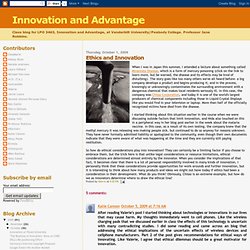
The story goes like too many others we've all heard before- a big company develops a product and begins producing it, and in the process, knowingly or unknowingly contaminates the surrounding environment with a dangerous chemical that makes local residents seriously ill. In this case, the company was Chisso Corporation, and today it is one of the world's largest producers of chemical components including those in Liquid Crystal Displays like you would find in your television or laptop. Heads-Up! on Organizational Innovation: Ethics of Innovation. Just because something can be done, should it?

Just because something has a market and can be financially viable, should it be? This morning's newspaper offered two "innovation" stories which prompts the idea that we should be talking about the ethics of innovation: -- The first pet clone was just sold to a woman for $50,000 to replace her beloved cat Nicky who had died after 17 years. The Link Between Ethics and Innovation. May 2007- -Is there a link between ethical companies and innovative companies?
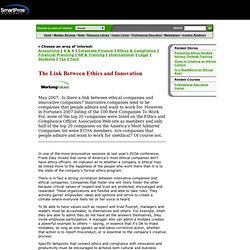
Innovative companies tend to be companies that people admire and want to work for. However, in Fortune's 2007 listing of the 100 Best Companies To Work For, none of the top 20 companies were listed on the Ethics and Compliance Officer Association Web site as members and only half of the top 20 companies on the America's Most Admired Companies list were ECOA members. Are companies that people admire and want to work for unethical? Of course not. In one of the more provocative sessions at last year's ECOA conference, Frank Daly mused that some of America's most ethical companies don't have ethics officers. There is in fact a strong correlation between innovative companies and ethical companies. To be able to have values such as respect and trust flourish, managers and leaders must be accountable, to themselves and others.
So how do we draw tighter connections? More articles by David Gebler ©2007 SmartPros Ltd. Aligned for Sustainable Design - IDEO & BSR Report. Guilé Foundation. Fondation Guilé is a Swiss foundation.
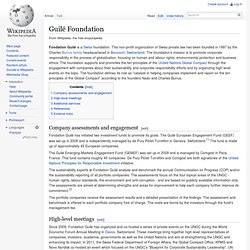
This non-profit organization of Swiss private law has been founded in 1997 by the Charles Burrus family headquartered in Boncourt, Switzerland. How consumer goods companies can tackle climate change - Unilever. INTERNATIONAL BUSINESS LEADERS FORUMRedefining growth fora sustainable world.
Methodology. The Blue Economy : Green Economy 2.0 : Nachhaltige Geschäftsmodelle. Sustainable, Nachhaltigkeit oder CSR ist Basis von ganzheitlichen Innovationen. The Blue Economy. The Blue Economy: 10 years - 100 innovations - 100 million jobs is a book by Gunter Pauli.
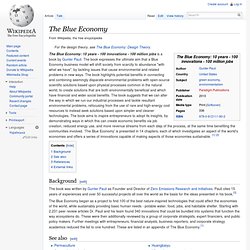
The book expresses the ultimate aim that a Blue Economy business model will shift society from scarcity to abundance "with what we have", by tackling issues that cause environmental and related problems in new ways. The book highlights potential benefits in connecting and combining seemingly disparate environmental problems with open-source scientific solutions based upon physical processes common in the natural world, to create solutions that are both environmentally beneficial and which have financial and wider social benefits. TBEBooklet. THE CLUB OF ROME (www.clubofrome.org) Club of Rome Reports and Bifurcations: a 40-year overview. 16 May 2012 | Draft.
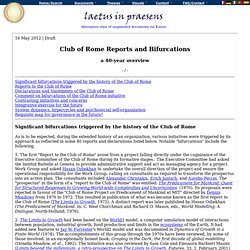
Club of Rome. The Club of Rome is a global think tank that deals with a variety of international political issues.
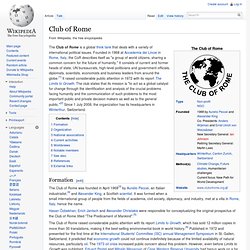
Founded in 1968 at Accademia dei Lincei in Rome, Italy, the CoR describes itself as "a group of world citizens, sharing a common concern for the future of humanity. " It consists of current and former heads of state, UN bureaucrats, high-level politicians and government officials, diplomats, scientists, economists and business leaders from around the globe.[1] It raised considerable public attention in 1972 with its report The Limits to Growth. The club states that its mission is "to act as a global catalyst for change through the identification and analysis of the crucial problems facing humanity and the communication of such problems to the most important public and private decision makers as well as to the general public. "[2] Since 1 July 2008, the organization has its headquarters in Winterthur, Switzerland.
Formation[edit] Organization[edit] National associations[edit] Worldviews[edit] Hasan Özbekhan. Dr.
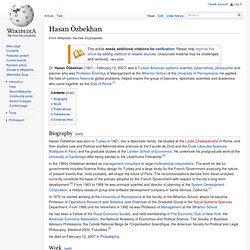
Hasan Özbekhan (1921 – February 12, 2007) was a Turkish American systems scientist, cyberneticist, philosopher and planner who was Professor Emeritus of Management at the Wharton School of the University of Pennsylvania. He applied the field-of-systems theory to global problems, helped inspire the group of planners, diplomats, scientists and academics who came together as the Club of Rome.[1] Biography[edit] Hasan Özbekhan was born in Turkey in 1921, into a diplomatic family.